#george s. mcgovern
Text
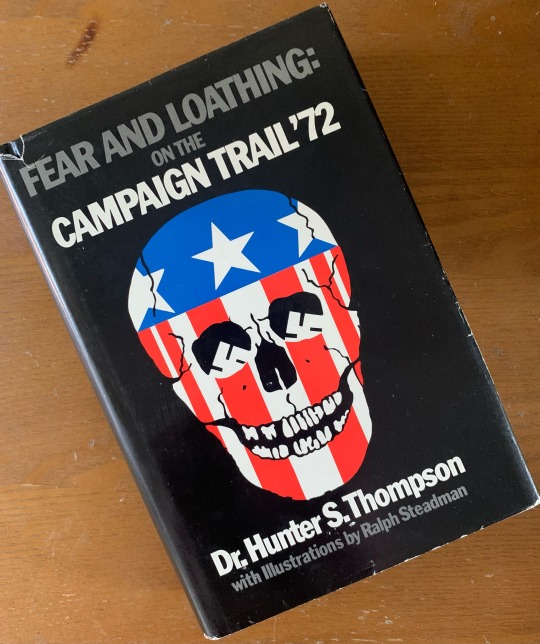
“The main problem in any democracy is that crowd pleasers are generally brainless swine who can go out on a stage & whup their supporters into an orgiastic frenzy - then go back to the office & sell every one of the poor bastards down the tube for a nickel apiece. Probably the rarest form of life in American politics is the man who can turn on a crowd & still keep his head straight - assuming it was straight in the first place.
Which harks back to McGovern's problem. He is probably the most honest big-time politician in America; Robert Kennedy, several years before he was murdered, called George McGovern "the most decent man in the Senate." Which is not quite the same thing as being the best candidate for President of the United States. For that, McGovern would need at least one dark kinky streak of Mick Jagger in his soul . . .
Not much, & perhaps not even enough so people would notice at lunch in the Capitol Hill Hotel or walking down the hallway of the Senate Office Building - but just enough to drift out on the stage in front of a big crowd & let the spectacle turn him on.
That may be the handle. Maybe the whole secret of turning a crowd on is getting turned on yourself by the crowd. The only candidate running for the presidency today who seems to understand this is George Wallace which might at least partially explain why Bobby Kennedy was the only candidate who could take votes away from Wallace in '68. Kennedy, like Wallace, was able to connect with people on some kind of visceral, instinctive level that is probably both above & below "rational politics." (page 127)
“McGovern's brain-trust, though, had come up with the idea that the Wallace vote was "soft” - that the typical Wallace voter, especially in the North and Midwest, was far less committed to Wallace himself than to his thundering, gut-level appeal to rise up and smash all the "pointy-headed bureaucrats in Washington" who'd been fucking them over for so long.
The root of the Wallace magic was a cynical, showbiz instinct for knowing exactly which issues would whip a hall full of beer-drinking factory workers into a frenzy - and then doing exactly that, by howling down from the podium that he had an instant, overnight cure for all their worst afflictions: Taxes? Nigras? Army worms killing the turnip crop? Whatever it was, Wallace assured his supporters that the solution was actually real simple, and that the only reason they had any hassle with the government at all was because those greedy bloodsuckers in Washington didn't want the problems solved, so they wouldn't be put out of work.
The ugly truth is that Wallace had never even bothered to understand the problems - much less come up with any honest solutions - but "the Fighting Little Judge" has never lost much sleep from guilt feelings about his personal credibility gap. Southern politicians are not made that way. Successful con men are treated with considerable respect in the South. A good slice of the settler population of that region were men who'd been given a choice between being shipped off to the New World in leg-irons and spending the rest of their lives in English prisons. The Crown saw no point in feeding them year after year, and they were far too dangerous to be turned loose on the streets of London - so, rather than overload the public hanging schedule, the King's Minister of Gaol decided to put this scum to work on the other side of the Atlantic, in The Colonies, where cheap labor was much in demand.
Most of these poor bastards wound up in what is now the Deep South because of the wretched climate. No settler with good sense and a few dollars in his pocket would venture south of Richmond. There was plenty of opportunity around Boston, New York, and Philadelphia - and by British standards the climate in places like South Carolina and Georgia was close to Hell on Earth: swamps, alligators, mosquitos, tropical disease . . . all this plus a boiling sun all day long and no way to make money unless you had a land grant from the King.
So the South was sparsely settled at first, and the shortage of skilled labor was a serious problem to the scattered aristocracy of would-be cotton barons who had been granted huge tracts of good land that would make them all rich if they could only get people to work it.
The slave-trade was one answer, but Africa in 1699 was not a fertile breeding ground for middle-management types . . . and the planters said it was damn near impossible for one white man to establish any kind of control over a boatload of black primitives. The bastards couldn't even speak English. How could a man get the crop in, with brutes like that for help?
There would have to be managers, keepers, overseers: white men who spoke the language, and had a sense of purpose in life. But where would they come from? There was no middle class in the South: only masters and slaves and all that rich land lying fallow.
The King was quick to grasp the financial implications of the problem: The crops must be planted and harvested, in order to sell them for gold - and if all those lazy bastards needed was a few thousand half-bright English-speaking lackeys in order to bring the crops in . . . hell, that was easy: Clean out the jails, cut back on the Crown's grocery bill, jolt the liberals off balance by announcing a new "Progressive Amnesty" program for hardened criminals . . .
Wonderful. Dispatch royal messengers to spread the good word in every corner of the kingdom; and after that send out professional pollsters to record an amazing 66 percent jump in the King's popularity . . . then wait a few weeks before announcing the new 10 percent sales tax on ale.
That's how the South got settled. Not the whole story, perhaps, but it goes a long way toward explaining why George Wallace is the Governor of Alabama. He has the same smile as his great-grandfather - a thrice-convicted pig thief from somewhere near Nottingham, who made a small reputation, they say, as a jailhouse lawyer, before he got shipped out.
Indeed. With a bit of imagination you can almost hear the cranky litle bastard haranguing his fellow prisoners in London's infamous Hardcase jail, urging them on to revolt:
"Lissen here, you poor fools! There's not much time! Even now up - there in the tower - they're cookin up some kind of cruel new punishment for us! How much longer will we stand for it? And now they want to ship us across the ocean to work like slaves in a swamp with a bunch of goddamn Hottentots!
"We won't go! It's asinine! We'll tear this place apart before we'll let that thieving old faggot of a king send us off to work next to Africans!
"How much more of this misery can we stand, boys? I know you're fed right up to here with it. I can see it in your eyes - pure misery! And I'm tellin' you, we don't have to stand for it! We can send the king a message and tell him how we feel! I'll write it up myself, and all you boys can sign it . . . or better still, I'll go talk to the king personally! All you boys have to do is dig me a little tunnel under the wall over there behind the gallows, and I'll . . . “
Right. That bottom line never changes: "You folks be sure and come to see me in the White House, you hear? There'll be plenty of room for my friends, after I clean house . . . but first I need your vote, folks, and after that I'll . . . “
George Wallace is one of the worst charlatans in politics, but there is no denying his talent for converting frustration into energy. What McGovern sensed in Florida, however - while Wallace was stomping him, along with all the others - was the possibility that Wallace appealed instinctively to a lot more people than would actually vote for him. He was stirring up more anger than he knew how to channel. The frustration was there, and it was easy enough to convert it - but what then? If Wallace had taken himself seriously as a presidential candidate - as a Democrat or anything else - he might have put together the kind of organization that would have made him a genuine threat in the primaries, instead of just a spoiler.” (pages 274 - 278)
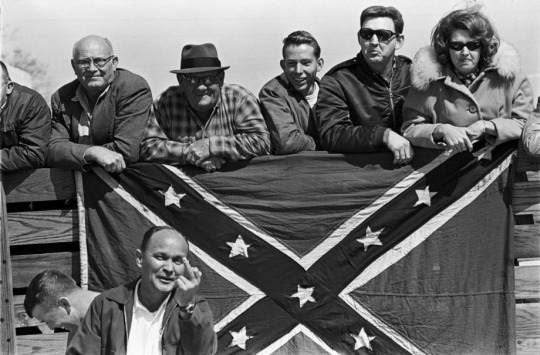
#thompson#hunter s thompson#fear and loathing#1972#nixon#richard nixon#mcgovern#george mcgovern#george wallace#the south#segregation#robert kennedy#1968#trump#trump presidency
13 notes
·
View notes
Text
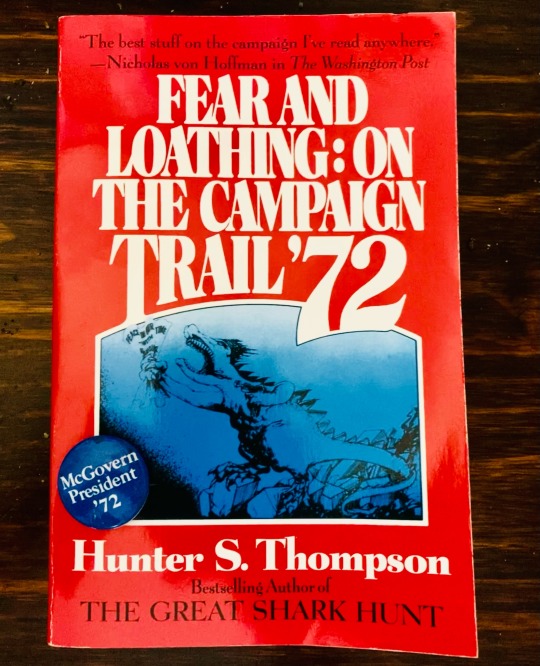
#books#Fear and loathing on the Campaign Trail 72#Hunter S Thompson#Gonzo#gonzo journalism#George McGovern#1970s#70s#1972#Democrat Party#DNC#Election
3 notes
·
View notes
Text






You're in my head
I had plans for the weekend
But wound up with you instead
Back here again
Got me deep in my feelings
When i should be in your bed
You and i go back to like '09 it's like forever
And you were there my lonely nights, yeah, keeping me together
So wouldn't it make sense if I was yours and you could call me your baby
But we say we're just, say we're just
Friends
Just for now
Yeah but friends don't say words that
Make friends feel like more than just
Friends
Just for now
Now I'm over pretending
So let's put the "end" in friends
Friends
Just for now
Yeah but friends don't say words that
Make friends feel like more than just
Friends are not supposed to get too close
And feel emotions that we're feeling now, now, now
We ain't slowing down, down, down
But once we cross the line, there's no denying you and I can never turn around, round, round
Know we'll never be the same
You and I go back to like '09 it's like forever
And you were there my lonely nights, yeah, keeping me together
So wouldn't it make sense if I was yours and you could call me your baby
But we say we're just, say we're just
Friends
Just for now
Yeah but friends don't say words that
Make friends feel like more than just
Friends
Just for now
Now I'm over pretending
So let's put the "end" in friends
V 'FRI(END)S' Release
🎧 Listen now: https://ingrv.es/friends
Credits:
Director: Samuel Bradley
Production Company: Iconoclast TV
EP: Maeva Tenneroni, Jean Mougin, Guy Rolfe
Head of Production: Kate Sharpe
Producer: Martha Mcguirk
Directors Agent: Yoni Yosef
Casting: Road Casting
Casting Director: Coralie Rose
Casting Assist: Luis Torrecilla, Laura Meredith
Love Interest: Ruby Sear
Production Manager: Chanel Parkinson
Production Co-ord: Alice Hayes
Artist Liason: Jo Thompson
Cast Co-ord: Beth Rubery
Production Assistant: Callum Anderson
Production Runner: Mia Tessema
Intimacy Coordinator: Stella Moss
Movement Director: Yagamoto
Location Manager: Ryan Colaco
Location Assistant: Eser Savrin, Lois Constantinou
1st AD: Ben Gill
2nd AD: Gabriel O’Donohoe
3rd AD: Kitty Rajakulasingham, Aloha Kulieshova
Runner: Kai Rajakulasingham, Joe Heap, Danny Zanre, Anna Kovalevska, Grace Goodworth, Kwesi Mcleod, Darren Sintes, Tyson Douglas, Tiger Brewers
DOP: Jake Gabbay
A CAM Focus Puller: Rozemarijn Stokkel
A CAM 2nd AC: Ania Bahadrian
Trainee: Guillem Zamora
B CAM Operator Day 1: Juanjo Salazar
B CAM Operator Day 2: Jomar O’Meally
B CAM 1st AC - Alex Rawson
B CAM Trainee: Ollie Wesley
Camera Car: Davide Viera
Key Grip: Darren Quinn
Crane Tech: Henry Stone
Grip Trainee: James Quinn
Gaffer: Kieran Brown
Electrician: Shuan Clark, Ed Irvine, John Joe Besagni, Akeel Fleary, Cieran Nash, Amarjeet Singh, Laurent Arnaud
Master Rigger: Lee Doran
Rigger: Joe Parrott, Jamie Brindle, Ryan Ross, Alfie Berry, Scott Allen, Joe Knight
Video Playback: Liam Coles
Playback Assistant: Elvis Mcgovern
DIT: Lilly Palmer
Production Designer: Staci Lee Hindley
Art Director: Nia Samuel
Prop Master: Ezra Piers Mantell
Prop Buyer: Jessa Thorpe, Shopie-Mai Wigans
Art Assistant: Harry Beedle, Camilla Byles, Tom Hope, George Mein, Freya Wentworth, Alice Moles
Home Economist: Olivia Somary
Action Vehicle Driver (Car): Dan Chester
Action Vehicle Driver (Bus): Tom Burnage
SFX; Sean Harland
SFX Technician: Danny Matters
Stunt Coordinator: Jim Dowdall
Stylist: Justin Hamilton
Stylist Assistant: Samela Gjozi, Colleen Finnerty, Lorna Lane, Chris Atkins, Vania Monteiro, Katherine Somavia, Anna Menshykova, Mel Lyse
Hair Stylist: Simon Izard
Hair Assistant: Julie West, Aaron Dorn, Natasha Rose, Natasha Lawes
Makeup Assistant: Sophie Gia Moore, Marta Wozniak
Makeup Trainee: Rebecca Robinson
Medic: Alex Gardner, Richard Drakesford
Paramedic: Lynsey Shewring
Mini Winnego Driver: Phil Rainer
Honeywagon Driver: John Suttion
Production Sprinter: Jos Benschop
Minibus Driver: Rob Higgs, Gavin Baker, Granger Goodey, Dean Cumbers
Label Vehicle: Blerim Morina, Othman Abashikh, Peter Tarling, Steven Smith
Artist Trailer: Paul Haddock
Artist Wardrobe: David Czekalski
Honeywagon Driver: Martin Dean
Wardrobe Truck: Warren Smart
Hmu Truck: Wally Smart
Dining Bus: Andy Byrne
Location Security: Randal Berbick, Billy Bridger, Alan Laney, Kerri Mccann, Malakai Mars, Angelo Evangelou, Richard Johnson, Mathew Richards
Edit House: Assembly Rooms
Editor: Jack Williams
Edit Producer: Phoebe Armstrong-Beaver
Edit Assist: Bruna Manfredi, Tamara Ishida
Post Production: Cheat
Grade: Toby Tomkins
Post Producer: Joanna Dawson, Jen Saunders
Post Sound House: Soundtree Music
Sound Designer: Jack Patterson
Sound Producer: Neil Athale
BIGHIT MUSIC. Rights are reserved selectively in the video. Unauthorized reproduction is a violation of applicable laws. Manufactured by BIGHIT MUSIC, Seoul, Korea.
Connect with BTS:
https://ibighit.com/bts
/ bts_bighit
/ bts_twt
/ bangtan.official
/ bangtantv
/ bts.bighitofficial
/ bts_official_bighit
https://weverse.onelink.me/qt3S/94808190
https://www.weibo.com/BTSbighit
http://btsblog.ibighit.com
#V_FRIENDS #FRI_END_S #뷔 #V
#bts v#bts taehyung#bts v friends#bts friends to lovers#bts rm#bts jihope#bts jimin#bts jungkook#bts jin#bts suga#bts army#bts v mv#bts new#kpop kings
9 notes
·
View notes
Text
Volcanoes
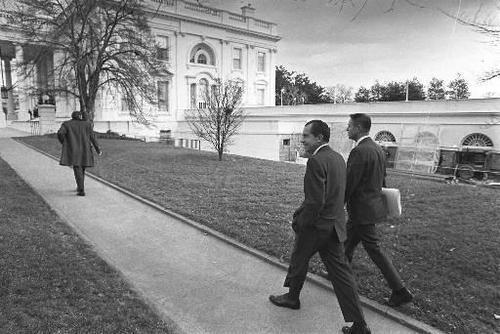
It was the crowning moment in Richard Milhous Nixon’s long career of political ups-and-downs. For the fifth time, Nixon had been a candidate on the national ticket (twice as Vice President, three times as President). In 1952 and 1956, the focus was on the top of the ticket, Nixon’s running mate, General Dwight D. Eisenhower. In 1960, Nixon narrowly lost to – and some would say was the victim of electoral theft from – John F. Kennedy. In 1968, Nixon finally won election to the Presidency, but he did so with some bitterness: the country was in shambles and the two people he wanted to oppose more than anyone else in the election – Lyndon B. Johnson and Bobby Kennedy – had respectively quit and been murdered during the turbulent campaign. Not only that, but in victory, Nixon had garnered only 43.4% of the vote – a full 6 percentage points less than he had earned in his 1960 loss to JFK.
On November 7, 1972, however, Nixon’s “Silent Majority” spoke loud and clear – and truly gave him both a majority victory and a strong mandate for his second term in the White House. Nixon trounced his opponent, Democratic Senator George S. McGovern, on election night. His popular vote victory was 61%-38% and Nixon’s margin in the Electoral College was even larger, 520-17. Nixon won every single state in the country except for Massachusetts. Nixon even won McGovern’s home state of South Dakota.
As the election returns rolled in and Nixon’s family, supporters, and staff celebrated, the man who had received the votes of 47,169,841 of his fellow Americans that day to be their President noted that he felt “a curious feeling, perhaps a foreboding, that muted my enjoyment of this triumphal moment." In his Memoirs (BOOK | KINDLE), Richard Nixon elaborated further, "I am at a loss to explain the melancholy that settled over me on that victorious night…To some extent the marring effects of Watergate may have played a part, to some extent our failure to win Congress, and to a greater extent the fact that we had not yet been able to end the war in Vietnam. Or perhaps it was because this would be my last campaign. Whatever the reasons, I allowed myself only a few minutes to reflect on the past. I was confident that a new era was about to begin, and I was eager to begin it.”
The new era began the next morning. At 12:00 PM on November 8, 1972, President Nixon gathered his Cabinet in the White House. Nixon seemed tired and was suffering from a painful toothache. National Security Adviser Henry Kissinger noted that the President seemed “grim and remote”. Nixon’s loyal Chief of Staff, H. R. “Bob” Haldeman was at his side as the President nonchalantly thanked his Cabinet and then described his recent readings about 19th Century British Prime Minister Benjamin Disraeli and how Disraeli described a need to refresh the British government and rid it of the “exhausted volcanoes” in William Gladstone’s Cabinet. Nixon’s Cabinet was perplexed and curious as to where the President was headed. He had just won a historic landslide victory in the Presidential election, but he spoke as if he had lost everything.
After a few more minutes of talking about his plans for a second term that wasn’t “lethargic” such as those of some of his predecessors, Nixon simply stood up and walked out of the Cabinet Room, headed across the South Lawn, boarded Marine One and flew to his Camp David retreat. When the President stands, everyone stands but as soon as he left the room, the Cabinet sat down and looked at Bob Haldeman, who took over the meeting. Haldeman handed pieces of paper out to the Cabinet and said, “You’re all a bunch of burned-out volcanoes”. Then he immediately demanded everyone’s resignation. Nixon had won one of the biggest victories in American electoral history, and 24 hours later, he was basically firing everyone who had helped him to do so – earlier in the day, he had done the same thing that he did to the Cabinet to his White House staff.
Henry Kissinger summed it up by saying that, “It was as if victory was not an occasion for reconciliation but an opportunity to settle the scores of a lifetime." For Richard Nixon, victory was never enough. He needed destruction. Nixon got rid of his exhausted volcanoes, but he was sitting on top of another volcano named Watergate. His abbreviated second term, which had been won the night before, would end less than two years later in his own personal and professional destruction.
#History#Richard Nixon#Presidents#President Nixon#Nixon Administration#Cabinet of Richard Nixon#Nixon Cabinet#Nixon#1972 Election#Politics#Presidency#Presidential History#Political History#Watergate#Presidential Elections#White House#White House History#H.R. “Bob” Haldeman#Bob Haldeman#Henry Kissinger
6 notes
·
View notes
Text
Watergate Anniversary: The Damning Moments That Fueled Nixon's Downfall
— By Jon Jackson | FridayJune 17, 2022
Friday marks the 50th anniversary of the break-in at the Democratic National Committee (DNC) headquarters at the Watergate hotel and office building, an event that precipitated the downfall of Richard Nixon's presidency.
A team of men had previously broken into Washington, D.C.'s Watergate complex in May 1972 on the orders of G. Gordon Liddy, an FBI agent who worked on Nixon's reelection committee, to bug DNC telephones. However, it was the arrests of five men for breaking into the headquarters a month later that resulted in one of the most notorious scandals in U.S. history.

Friday marks the 50th anniversary of the Watergate break-in that led to the resignation of President Richard Nixon. Above, Nixon gives his farewell remarks before leaving the White House on August 9, 1974. Photo By Dirck Halstead/Liaison Through Getty Images
The Nixon administration, which was facing a contentious presidential election against the backdrop of the Vietnam War, denied involvement in the days after the arrests. Two reporters from The Washington Post—Bob Woodward and Carl Bernstein—soon began investigating and followed a criminal trail that led all the way to the Oval Office.
“I'm Not a Crook.”
— President Richard Nixon at a 1973 news conference.
The Background
The New York Times published the Pentagon Papers in the summer of 1971. This report from the Department of Defense detailed the history of U.S. involvement in Vietnam. Nixon was reportedly infuriated by the report being made public, and a special investigations team put together by the White House was nicknamed "the Plumbers" since their job was to stop future classified leaks. (Liddy was a member of this unit before he was moved to the reelection committee.)
The first major known job for the Plumbers was to break into the office of the psychiatrist for Daniel Ellsberg, a military analyst who leaked the Pentagon Papers to the Times. The team ultimately proved unsuccessful in finding information the White House could use to besmirch Ellsberg.
Months before the Times ran the Pentagon Papers, Nixon had already had a secret taping system installed in the Oval Office. This decision would later come back to haunt him.
The Break-In
Attorney General John Mitchell signed off on Liddy undertaking a plan to spy on the Democratic Party. Although polls found Nixon had a sizable lead against his opponent, George McGovern, the president reportedly sought more of an edge over his political rivals.
On June 17, five men—three Cuban exiles, one Cuban American and former CIA agent James McCord—were arrested after breaking into the Watergate. Film, bugging devices and thousands of dollars of cash were found on them. White House press secretary Ron Ziegler responded afterward that the president would not comment on a "third-rate burglary attempt." At a press conference a few days later, Nixon denied involvement.
Deep Throat
Three days after the break-in, Woodward met for the first time with an informant he called "Deep Throat," whose nickname came from a popular pornographic film at the time. The informant's identity remained secret until W. Mark Felt, the associate director of the FBI, revealed he was Deep Throat in 2005.
Woodward and Bernstein began doggedly reporting on the developing scandal with a story for the Post about a $25,000 check from Nixon's campaign that was found deposited in a bank account for one of the men arrested at the Watergate. They soon reported damning evidence on Mitchell and the links between Nixon aides and the break-in.
While the Post began unraveling the White House's involvement in the break-in, Nixon announced that an internal investigation had cleared him and his staff of any wrongdoing.
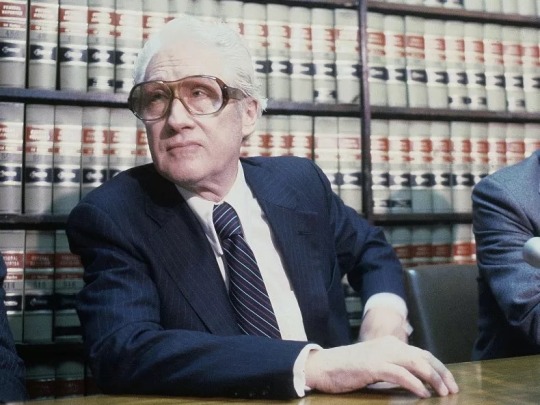
Woodward met for the first time with an informant he called "Deep Throat," whose nickname came from a popular pornographic film at the time. In this file photo Former FBI official Mark Felt, appears at a news conference, April 15, 1981 after learning that President Reagan had pardoned him from the conviction of unauthorized break-ins during the Nixon administration's search for opponents during the Vietnam War. Bob Daugherty/AP
The Trial
Nixon won the 1972 election in a landslide, but a Watergate trial began in January 1973. Liddy and McCord were soon convicted on multiple charges, including conspiracy. A letter from McCord's that detailed a larger plan was revealed to the court in March, and White House counsel John Dean, whom Nixon eventually fired, began cooperating with a Senate select committee's investigation in April.
A Cover-Up Is Uncovered
McCord admitted payoffs were given to the Watergate burglars from the reelection committee, and the then-FBI director confessed to destroying documents related to the break-in. About the same time, Nixon aides and Attorney General Richard Kleindienst resigned.
In May 1973, the Senate Select Committee on Presidential Campaign Activities began its televised hearings on the Watergate scandal. In June, Dean testified to the committee about speaking with Nixon about the break-in and cover-up dozens of times.
In July, White House staff members told investigators about Nixon's Oval Office taping system. Nixon then spent months fighting the committee on turning over tapes. Though the president acknowledged that "abuses" had taken place in his administration, he did not admit to any direct role in the crimes.
Meanwhile, Vice President Spiro Agnew was hit with charges unrelated to Watergate and resigned in October 1973. He was replaced by Michigan congressman Gerald Ford. The same month, Nixon fired Archibald Cox from his role as the Justice Department's special prosecutor in the Watergate investigation.
"I'm not a crook," Nixon infamously said during a national press conference in November. (He was responding to a question about his personal finances and tax payments while in the White House.) Days later, investigators reported the presence of an 18½-minute gap in a recorded conversation that took place days after the break-in between Nixon and his chief of staff. Nixon's secretary later said she was responsible for accidentally causing the gap.
The Impeachment
In May 1974, the House Judiciary Committee began impeachment proceedings against Nixon after indictments had been already handed down for several administration officials. In July, the Supreme Court ruled Nixon had to turn over dozens of tape recordings to the new special prosecutor of the Watergate investigation.

A tape recorder used to tape President Nixon's White House conversations. The Richard Nixon Presidential Library and Museum in Yorba Linda, CA. Ted Soqui/Getty
The same month, the House Judiciary Committee passed three articles of impeachment against Nixon, for obstruction of justice, misuse of power and contempt of Congress. On August 8, Nixon announced his resignation before the full House could vote on the articles.
"I have never been a quitter," Nixon said in his farewell remarks. "To leave office before my term is completed is abhorrent to every instinct in my body. But as president I must put the interest of America first."
— Newsweek
2 notes
·
View notes
Text
youtube
What is your first political hero and why?
COMMENTARY:
Probably Eisenhower, as these things go.
I voted for Nixon before I went to Vietnam and I voted for him when I got back and I;ve nevr had a reason to regret my vote., He wasn’t my hero: he just had a better platform that the Democrats, who have been out of ideas since Tet 1968 and clustered around McGovern because his lack of understanding bout what was actually going in Vietnam relative to the Cold war satisfied the self-righteousness for avoiding military service as a moral imperative.
I voted fro Reagan, twice, as a reflexive Eisenhower Republican vote, but I stopped voting Republican in 1988, when it became apparent the Conservativ agenda was to pack the supreme Court with Fascists, beginning with Antonin Scalia. If I had fully understood the spiritual toxin that Campus Crusade for Christ represented in Conservative politics, I would have shifted my voter much earlier.
If there is any one person in politics I admired unequivocally, it would be Ray Price, Nixon’s mort faithful speech writer, I probably could have had a job in the White House as a research assistant to Ran after 1973, but it was on a venture capital track, number one, and, number two, it would have meant working in the same building with Pat Buchanan and the other Plumbers, who turned out to be the cancer that was growing around the Nixon Presidency and became the political evangelicals for William F. Buckley’s Nazification agenda which continues to dominate the GOP.
Ray Price represented the demarcation between the adult leadership for the GOP in the Nixon White House and the representatives of the John Birsh Society that hijacked Barry Goldwater’s Conservative brand as campaign workers in 1964. I would have voted for LBJ in 1964 althoug I was no fan of either JFK or LBJ because the Goldwater campaign was such an obvious refuge for white supremacists and George Lincoln Rockwell Brown Shirts who woul dominate William F. Buckley’s Young Americans for Freedom as part of his campus strategy for the Nazification of American politics and sabotage of Eisenhower;s 1956 Presidential Platform , which was designed to transform the Military Industrial Complex of the Cold War to the Aerospace-Entrepreneurial Matrix of Eisenhower’s Star Wars economics that was dramatized in 2001: A Space Odyssey and produced Apollo 11.
John Oliver’s essay on McKinsey outlines the extent of the deliberate corporate Nazification of American by the Ivy League Socialism of William F. Buckley and the John Birch Society.
0 notes
Text
My US Voting Record:
I made this with the help of wikipedia, google and posts like voting guides which I found online.
Note: I would have been a Monarchist during the Revolutionary War, but I'd probably still vote if living in America (No matter how displeased the revolution made me, I'd probably still always be willing to vote). But to show my dissatisfaction, every vote until 1824 is a protest vote:
1788: Nobody (I refuse to vote for George Washington). Maybe a write in protest vote for King George III?
1792: Nobody (I refuse to vote for George Washington). Maybe a write in protest vote for King George III?
1796: Maybe a write in protest vote for King George III?
1800: Maybe a write in protest vote for King George III?
1804: Maybe a write in protest vote for King George III?
1808: Maybe a write in protest vote for King George III?
1812: Protest Vote for King George III (I can't vote for anyone after the War of 1812 got started)
1816: Protest Vote for King George III (again, I don't know if I'd be able to forgive anyone after the War of 1812)
1820: Protest Vote for King George IV (I can't support Monroe after he helped fight 1812 against Canada and the British).
1824: Henry Clay/Nathan Sanford
1824 Contingent: John Quincy Adams
1828: John Quincy Adams/Richard Rush
1832: Henry Clay/John Sergeant
1836: Daniel Webster/Francis Granger or William Henry Harrison/Francis Granger
1840: William Henry Harrison/John Tyler
1844: Henry Clay/Theodore Frelinghuysen
1848: Martin Van Buren/Charles F. Adams
1852: John P. Hale/George W. Julian
1856: John C. Frémont/William L. Dayton
1860: Abraham Lincoln/Hannibal Hamlin
1864: Abraham Lincoln/Andrew Johnson
1868: Ulysses S. Grant/Schuyler Colfax
1872: Horace Greeley/Benjamin Gratz Brown
1876: Samuel Tilden/Thomas A. Hendricks
1880: James A. Garfield/Chester A. Arthur
1884: Grover Cleveland/Thomas A. Hendricks
1888: Benjamin Harrison/Levi P. Morton
1892: James B. Weaver/James G. Field
1896: William Jennings Bryan/Thomas E. Watson
1900: William Jennings Bryan/Adlai Stevenson I
1904: Eugene V. Debs/Benjamin Hanford
1908: William Jennings Bryan/John Kern
1912: Eugene V. Debs/Emil Seidel
1916: Allan L. Benson/George R. Kirkpatrick
1920: Eugene V. Debs/Seymour Stedman
1924: Robert M. LaFollette/Burton K. Wheeler
1928: Al Smith/Joseph T. Robinson (although Herbert Hoover and Charles Curtis aren't bad either. I might've been a prohibitionist then, considering I hate the taste of alcohol. But Smith opposed lynching. So he gets my vote).
1932: Norman Thomas/James H. Maurer
1936: Norman Thomas/George A. Nelson
1940: Norman Thomas/Maynard Krueger
1944: Norman Thomas/Darlington Hoopes
1948: Henry A. Wallace/Glen H. Taylor
1952: Adlai Stevenson II/John Sparkman
1956: Adlai Stevenson II/Estes Kefauver
1960: Richard Nixon/Henry Cabot Lodge Jr. (Solely because I hate JFK)
1964: Lyndon B. Johnson/Hubert Humphrey
1968: Hubert Humphrey/Edmund Muskie
1972: George McGovern/Sargent Shriver (although I still really like Thomas Eagleton as VP)
1976: Gerald Ford/Bob Dole
1980: Jimmy Carter/Walter Mondale
1984: Walter Mondale/Geraldine Ferraro
1988: Willa Kenoyer/Ron Ehrenreich (I hear Michael Dukakis went to high school with the guy who founded the Judge Rotenberg Centre, which is a terrible place. So I can't vote for Dukakis. Can't take a chance on him with that history).
1992: Ross Perot/James Stockdale
1996: Ross Perot/Pat Choate
2000: Ralph Nader/Winona Laduke
2004: Ralph Nader/Peter Camejo
2008: Ralph Nader/Matt Gonzalez
2012: Barack Obama/Joe Biden (Beginning in 2012, I'd probably start voting for Democrats more often because I felt I had no choice. But I'm still a bit unhappy with them. Haven't been since 1988 or 1992).
2016: Gloria La Riva/Eugene Puryear
2020: Joe Biden/Kamala Harris (My heart says Howie Hawkins/Angela Walker, however).
#us politics#politics#my voting record#If I was american or alive then#my random thoughts#autism#asd#autistic#adhd#neurodivergence#neurodivergent#audhd#random thoughts#my thoughts#ramblings
1 note
·
View note
Text
What Would Happen If World War 3 Started This Yesr
Paired with an advanced ballistics system, genuine armor system, or life-like weaponry, by playing WW3 you will get hold of an impression of authenticity and really make your mark on the battlefield. They require the realism to face up to the dangers ahead, the imaginative and prescient to see that a solution lies in reaching a steadiness between their countries’ forces, and the restraint to refrain from using their offensive powers to the utmost. China’s president, Xi Jinping, solely just lately contacted Volodymyr Zelensky, his Ukrainian counterpart, for the first time since Russia invaded Ukraine in February last 12 months. Many observers have dismissed Mr Xi’s name as an empty gesture designed to placate Europeans, who complain that China is simply too near Russia. By distinction, Mr Kissinger sees it as a declaration of great intent that may complicate the diplomacy surrounding the struggle, however which can also create precisely the sort of alternative to construct the superpowers’ mutual trust discover more information here.

With one eye on the diplomatic manoeuvres that more or less kept the peace in the 19th century, he looks to Britain and France to assist the United States think strategically about the balance of energy in Asia. He acknowledges that even experts in AI do not know what its powers will be (going by the proof of our discussions, transcribing a thick, gravelly German accent remains to be past its capabilities). But Mr Kissinger believes that AI will turn out to be a key think about security within five years.
During the Cold War era (1947–1991), several military events have been described as having come close to doubtlessly triggering when is World War III. Exercise Mainbrace brought together 200 ships and over 50,000 personnel to follow the protection of Denmark and Norway from the Soviet attack in 1952. The exercise was jointly commanded by Supreme Allied Commander Atlantic Admiral Lynde D. McCormick, USN, and Supreme Allied Commander Europe General Matthew B. Ridgeway, US Army, in the course of the autumn of 1952. When Mr Kissinger got here to Washington, politicians from the 2 events would routinely dine together. He was on pleasant terms with George McGovern, a Democratic presidential candidate.
European Command that practiced command and management procedures, with emphasis on the transition from solely conventional operations to chemical, nuclear, and traditional operations during a time of struggle. "Operation Dropshot" was the 1950s United States contingency plan for a possible nuclear and traditional warfare with the Soviet Union within the Western European and Asian theaters. Although the state of affairs made use of nuclear weapons, they weren't anticipated to play a decisive function.
The development website on which he works right now seems to be the set of a film in regards to the atrocities dedicated by Hitler during WWII. Against all odds, he's given a film function, a home and an opportunity at being anyone. Shakib's scheme to hide her goes tragically wrong and threatens to wreck his newfound standing and what seemed to be the chance of a lifetime.
youtube
Rather than listing all their grievances, the American president would say to his Chinese counterpart, “Mr President, the 2 biggest risks to peace right now are us two. In the sense that we now have the capability to destroy humanity.” China and America, without formally announcing anything, would purpose to practise restraint. This so-called 'New Nostradamus' lately spoke on his YouTube channel and provided the answers that will lead human beings to go through a army event that has not occurred since 1945, when the Second World War ended with the give up of Nazi Germany. STRONG TEAMPLAY
“And I imagine I’ve spent my life attempting to cope with it.” In his view, the destiny of humanity is dependent upon whether or not America and China can get along. He believes the speedy progress of AI, specifically, leaves them only five-to-ten years to find a way. World War three, also called the Third World War, refers back to the subsequent possible worldwide army battle.
In coverage the Biden administration has adopted Mr Trump’s lead, but with liberal rhetoric. "Either submarines will hit each other or planes will minimize each other off or anyone triggers it, and it all begins to spiral out of control." According to Hamilton-Parker, it goes to be triggered by the collision of two plane or submarines, which is ready to set off a sequence of occasions. As the seer said, World War III will begin in 2023 and it'll all start in Taiwan, identified to be the trigger of conflicts with China, as they have a tense relationship that has been rising more and more heated in current months. We launched Year One of open beta with 4 huge content material updates known as “Operations”. Sign in to see the reason why you may or might not like this based mostly on your video games, pals, and curators you follow.
The reason behind the confrontation was the occupational status of the German capital city, Berlin, and of post–World War II Germany. The Berlin Crisis began when the USSR launched an ultimatum demanding the withdrawal of all armed forces from Berlin, including the Western armed forces in West Berlin. The disaster culminated in the metropolis's de facto partition with the East German erection of the Berlin Wall.
Each Operation is a big replace featuring new maps, gameplay parts, game modes, combat techniques, and multiple powerful improvements. Global Operations are the seasonal content material upgrades with new battle zones, nations, or places that increase and escalate the continuing clash within the recreation. NATO operational plans for a Third World War have concerned NATO allies who do not have their nuclear weapons, using nuclear weapons supplied by the United States as part of a common NATO war plan, beneath the path of NATO's Supreme Allied Commander. Never a fan of policymaking bureaucracies, Mr Kissinger wish to see a small group of advisers, with easy accessibility to one another, working collectively tacitly. Neither side would basically change its place on Taiwan, but America would take care over the method it deploys its forces and take a look at to not feed the suspicion that it supports the island’s independence. He would start by decreasing the temperature, after which gradually construct confidence and a working relationship.
"Dropshot" included mission profiles that might have used 300 nuclear bombs and 29,000 high-explosive bombs on 200 targets in one hundred cities and towns to wipe out 85% of the Soviet Union's industrial potential in a single stroke. Between seventy five and a hundred of the 300 nuclear weapons had been focused to destroy Soviet combat plane on the ground. You are in control of the armed forces of one of the leading nations of this world, responsible for its army expansion, economic improvement, technological research and overseas diplomacy. Conflict of Nations is a free-to-play browser-based strategy game, where fashionable global warfare is waged in real-time in opposition to dozens of other players, in campaigns spanning days and even weeks. The Berlin Crisis of 1961 was a political-military confrontation between the United States and the Soviet Union at Checkpoint Charlie with both several American and Soviet/East German tanks and troops at the stand-off at each other only 100 yards on either side of the checkpoint.
Take the struggle to a worldwide level with a raft of wonderful bonus content material to use in World War 2.
Mr Kissinger’s third piece of recommendation for aspiring leaders is to “link all of these to your domestic aims, whatever they're.” For America, that includes learning the means to be extra pragmatic, focusing on the qualities of leadership and, most of all, renewing the country’s political culture. Following Mr Xi’s name to Mr Zelensky, Mr Kissinger believes that China may be positioning itself to mediate between Russia and Ukraine. As one of the architects of the policy that pitted America and China towards the Soviet Union, he doubts that China and Russia can work together well. True, they share a suspicion of the United States, however he also believes that they've an instinctive mistrust of one another. “I have by no means met a Russian leader who mentioned anything good about China,” he says.
Newspapers speculated when this plan was declassified, that France and the UK were to not be hit to get them to withhold using their nuclear weapons. With the advent of the Cold War in 1945 and with the spread of nuclear weapons expertise to the Soviet Union, the possibility of a third global conflict elevated. During the Cold War years, the potential for a 3rd world struggle was anticipated and planned for by army and civil authorities in many countries.
Such a settlement, during which Russia loses some positive aspects but retains others, may go away each a dissatisfied Russia and a dissatisfied Ukraine. In a current speech Janet Yellen, America’s treasury secretary, suggested that these should include climate change and the economic system. Although he's “all for” motion on the local weather, he doubts it might possibly do much to create confidence or help set up a steadiness between the 2 superpowers. On the economy, the danger is that the commerce agenda is hijacked by hawks who're unwilling to offer China any room to develop in any respect. At the end of April The Economist spoke to Mr Kissinger for over eight hours about tips on how to forestall the contest between China and America from descending into war. These days he's stooped and walks with difficulty, however his mind is needle-sharp.
The distinction is between imposing them, or saying that it'll have an result on relations, however the determination is theirs. The task nows to bring the warfare to an finish, without setting the stage for the next round of battle. Mr Kissinger says that he wants Russia to give up as much as possible of the territory that it conquered in 2014, but the actuality is that in any ceasefire Russia is prone to maintain Sevastopol (the biggest metropolis in Crimea and Russia’s major naval base on the Black Sea), on the very least.
Seven Days to the River Rhine was a top-secret military simulation exercise developed in 1979 by the Warsaw Pact. Individual Warsaw Pact states had been solely assigned their subpart of the strategic picture; in this case, the Polish forces have been only expected to go as far as Germany. The Seven Days to the Rhine plan envisioned that Poland and Germany can be largely destroyed by nuclear exchanges and that large numbers of troops would die of radiation illness. It was estimated that NATO would fireplace nuclear weapons behind the advancing Soviet traces to cut off their supply traces and thus blunt their advance. While this plan assumed that NATO would use nuclear weapons to push again any Warsaw Pact invasion, it did not embrace nuclear strikes on France or the United Kingdom.
Although he later believed in disarmament treaties slowly blunting the hazard of nuclear weaponry by reducing their quantity and alert status, he also believed a technological answer may permit incoming ICBMs to be shot down, thus making the US invulnerable to a first strike. However, the USSR noticed the SDI concept as a significant menace, since a unilateral deployment of the system would allow the US to launch an enormous first strike on the Soviet Union without any worry of retaliation. Exercise Reforger (from the REturn of FORces to GERmany) was an annual train performed through the Cold War by NATO. The Warsaw Pact outnumbered NATO throughout the Cold War in typical forces, and especially in tanks and armoured vehicles. Therefore, in the event of a Soviet invasion, so as not to resort to tactical nuclear strikes, NATO forces defending in opposition to a Warsaw Pact armored spearhead must be rapidly resupplied and replaced. The state of affairs was devised earlier than the development of intercontinental ballistic missiles.
He compares its disruptive potential to the invention of printing, which unfold concepts that played a part in causing the devastating wars of the sixteenth and seventeenth centuries. He believes that China’s leadership resents Western policymakers’ speak of a world rules-based order, when what they actually mean is America’s rules and America’s order. China’s rulers are insulted by what they see because the condescending bargain offered by the West, of granting China privileges if it behaves (they surely assume the privileges must be theirs by right, as a rising power). Indeed, some in China suspect that America will never deal with it as an equal and that it’s foolish to think about it would. It is foremost a strong emphasis on team cooperation inside the national army forces, full body consciousness, and intensive, versatile customization.
For a national security adviser from the opposite side that may be unlikely today, he believes. Gerald Ford, who took over after Nixon resigned, was the type of person whose opponents might rely on him to act decently. Franklin D. Roosevelt was far-sighted sufficient to prepare an isolationist America for what he saw as an inevitable warfare in opposition to the Axis powers.
As he contemplates his subsequent two books, on synthetic intelligence (AI) and the character of alliances, he remains extra excited about wanting ahead than raking over the past. References also circumstantially linked to this war have been that of the a quantity of nuclear winters Earth was stated to have seen in its 21st century in "A Matter Of Time". Following the occasions of 1969, the Soviet Union additional elevated its forces along the Sino-Soviet border, and within the Mongolian People's Republic. In the event of a conflict, it would be the actual plan to strengthen the NATO presence in Europe.[citation needed] In that occasion, it might have been known as Operation Reforger. The political goals of Reforger were to promote extended deterrence and foster NATO cohesion.[27] Important parts in Reforger included the Military Airlift Command, the Military Sealift Command, and the Civil Reserve Air Fleet. He recollects a perform at which a former senior Indian administrator explained that international coverage ought to be based mostly on non-permanent alliances geared to the issues, rather than tying up a rustic in huge multilateral structures.
Otto von Bismarck engineered German unification, and ruled with dexterity and restraint—only for his nation to succumb to war-fever after he was ousted. The problem for Mr Kissinger is the corollary, which is that ethical ideas too often override interests—even when they will not produce fascinating change. He acknowledges that human rights matter, but disagrees with placing them on the coronary heart of your policy.
Scenarios ranged from standard warfare to limited or whole nuclear warfare. At the peak of the Cold War, the doctrine of mutually assured destruction (MAD), which decided that an all-out nuclear confrontation would destroy all the states involved within the conflict, developed. The potential for absolutely the destruction of the human species might have contributed to each American and Soviet leaders avoiding such a state of affairs.
IN BEIJING THEY have concluded that America will do something to keep China down. In Washington they're adamant that China is scheming to supplant the United States as the world’s leading power. For a sobering analysis of this growing antagonism—and a plan to prevent it causing a superpower war—visit the 33rd floor of an Art Deco constructing in midtown Manhattan, the office of Henry Kissinger. ARMOR VS. PROJECTILE
1 note
·
View note
Text
Stroke: Thrombectomy Improved Functional Outcomes Overall and Across Different Subgroups

MedicalResearch.com Interview with:

Dr. Sarraj
Amrou Sarraj, MD FAHAProfessor of Neurology, Case Western Reserve University School of MedicineGeorge M. Humphrey II Endowed Chair, University Hospitals Neurological Institute
Director, Comprehensive Stroke Center and Stroke Systems, University Hospitals
MedicalResearch.com: What is the background for this study? What are the main findings?
Response: Endovascular thrombectomy was proven safe and effective in patients with acute ischemic, stroke, neurologist, occlusion presenting up to 24 hours from last known well in multiple clinical trials. Patients with large ischemic changes were largely excluded from those trials, and thus limited randomized evidence of thrombectomy in this patient population exists.
Our study found that thrombectomy improved the odds of achieving better functional outcomes by 1.5 times in patients with large ischemic changes on non-contrast CT or perfusion imaging. Proportion of patients achieving functional independence (mRS 0-2) and Independent ambulation (mRS 0-3) were also significantly higher with thrombectomy. Symptomatic hemorrhage occurred in very few patients and was not higher with thrombectomy. Results from analyses of subgroup based on clinical and imaging characteristics were also largely similar to those of primary analysis.
MedicalResearch.com: What should readers take away from your report?
Response: We observed that thrombectomy improved functional outcomes overall and across different subgroups in patients from North America, Europe and Australia and New Zealand. With available results of RESCUE Japan LIMIT trial showed better rates of independent ambulation in patients with large ischemic strokes and ANGEL ASPECT trial in China, I believe we have enough evidence to support thrombectomy procedure in this patient population.
MedicalResearch.com: What recommendations do you have for future research as a results of this study?
Response: Endovascular thrombectomy has been proven one of the most effective treatment in the history of medicine. With the results of our trial, one more frontier has been conquered to extend the treatment to thousands of patients with larger strokes who may benefit. Optimization of health care systems and enhancing thrombectomy delivery should be a priority to offer this potent intervention to more patients. Optimization of patients' care post thrombectomy, care transition and rehabilitations delivery would be vital to improve patients' outcomes.
MedicalResearch.com: Is there anything else you would like to add? Any disclosures?
Response: SELECT and SELECT2 trials were investigator-initiated studies funded by research grants from Stryker Neurovascular to University Hospitals Cleveland Medical Center and UT McGovern Medical School. In addition, Dr Sarraj was an advisory board and speaker bureau member for Stryker Neurovascular and an advisory board member for AstraZeneca.
Citation:
Trial of Endovascular Thrombectomy for Large Ischemic Strokes A. Sarraj, A.E. Hassan, M.G. Abraham, S. Ortega‑Gutierrez, S.E. Kasner, M.S. Hussain, M. Chen, S. Blackburn, C.W. Sitton, L. Churilov, S. Sundararajan, Y.C. Hu, N.A. Herial, P. Jabbour, D. Gibson, A.N. Wallace, J.F. Arenillas, J.P. Tsai, R.F. Budzik, W.J. Hicks, O. Kozak, B. Yan, D.J. Cordato, N.W. Manning, M.W. Parsons, R.A. Hanel, A.N. Aghaebrahim, T.Y. Wu, P. Cardona‑Portela, N. Pérez de la Ossa, J.D. Schaafsma, J. Blasco, N. Sangha, S. Warach, C.D. Gandhi, T.J. Kleinig, D. Sahlein, L. Elijovich, W. Tekle, E.A. Samaniego, L. Maali, M.A. Abdulrazzak, M.N. Psychogios, A. Shuaib, D.K. Pujara, F. Shaker, H. Johns, G. Sharma, V. Yogendrakumar, F.C. Ng, M.H. Rahbar, C. Cai, P. Lavori, S. Hamilton, T. Nguyen, J.T. Fifi, S. Davis, L. Wechsler, V.M. Pereira, M.G. Lansberg, M.D. Hill, J.C. Grotta, M. Ribo, B.C. Campbell, and G.W. Albers, for the SELECT2 Investigators*
This article was published on February 10, 2023, at NEJM.org. DOI: 10.1056/NEJMoa2214403 https://www.nejm.org/doi/pdf/10.1056/NEJMoa2214403
The information on MedicalResearch.com is provided for educational purposes only, and is in no way intended to diagnose, cure, or treat any medical or other condition. Always seek the advice of your physician or other qualified health and ask your doctor any questions you may have regarding a medical condition. In addition to all other limitations and disclaimers in this agreement, service provider and its third party providers disclaim any liability or loss in connection with the content provided on this website.
Read the full article
0 notes
Text
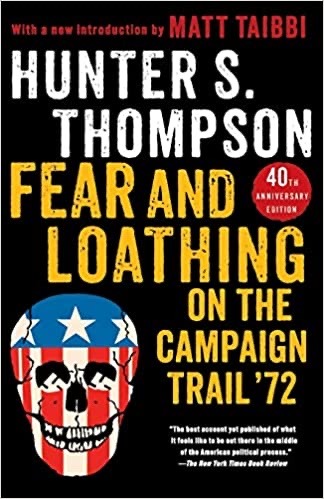
Fear and Loathing on the Campaign Trail ‘72 - Hunter S. Thompson
Hilarious, terrifying, insightful, and compulsively readable, these are the articles that Hunter S. Thompson wrote for Rolling Stone magazine while covering the 1972 election campaign of President Richard M. Nixon and his unsuccessful opponent, Senator George S. McGovern. Hunter focuses largely on the Democratic Party's primaries and the breakdown of the national party as it splits between the different candidates. With drug-addled alacrity and incisive wit, Thompson turned his jaundiced eye and gonzo heart to the repellent and seductive race for president, deconstructed the campaigns, and ended up with a political vision that is eerily prophetic.
Read if You Like:
Nonfiction
Politics
Humor
History
Recommended if You Enjoy:
Hunter S. Thompson (Fear and Loathing in Las Vegas, Fear and Loathing in America)
3/5
#fear and loathing on the campaign trail#fear and loathing on the campaign trail ‘72#hunter s thompson#book recommendations#authors#books#what to read#what to read next#libraries#books & libraries#literature#book reading#good books to read#book list#nonfiction#essay compilations#rolling stone magazine#rolling stone#politics#humor#history#fear and loathing in las vegas#fear and loathing in america#book lists#essay collection
0 notes
Photo

“I'm fed up to the ears with old men dreaming up wars for young men to die in.”
#George S. McGovern#Fed Up !#Justify War ?#STOP WARS#War Machine#System Failure#Return ❤️ Unite ❤️ Future Generations Included ❤️#Just Being ✌👀✌#smart kid :)
28 notes
·
View notes
Photo
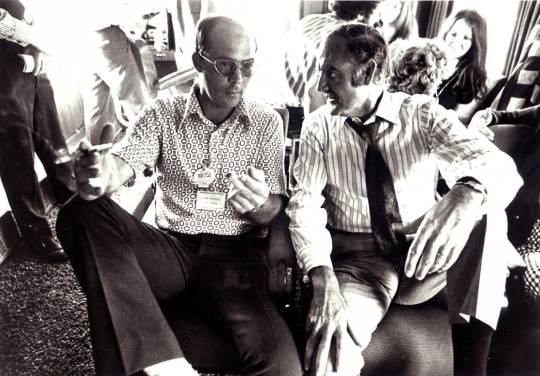
52 notes
·
View notes
Photo

“I'm fed up to the ears with old men dreaming up wars for young men to die in.”
― George S. McGovern
130 notes
·
View notes
Quote
I'm fed up to the ears with old men dreaming up wars for young men to die in.
George S. McGovern
0 notes
Text
and history repeats, and history repeats, and history repeats—

Erich Maria Remarque, All Quiet on the Western Front

Haruki Murakami, Kafka on the Shore
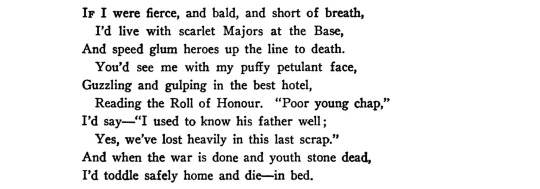
Siegfried Sassoon, Counter-Attack and Other Poems; ‘Base Details’

Dalton Trumbo, Johnny Got His Gun
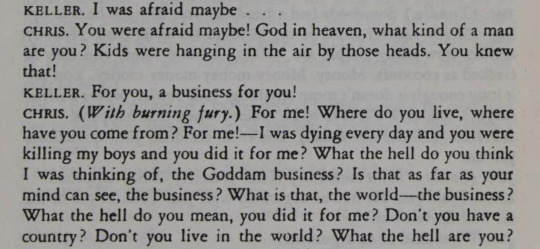
Arthur Miller, All My Sons

Herbert Hoover, to the 23rd Republican National Convention in June 1944

Markus Zusak, The Book Thief

Ernest Hemingway, For Whom the Bell Tolls
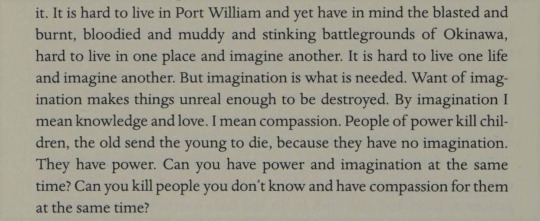
Wendell Berry, Hannah Coulter

Jamala, 1944
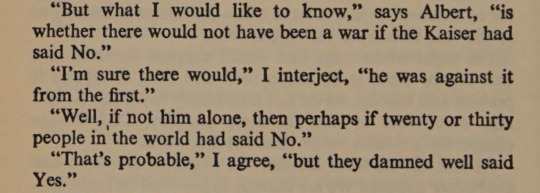
Erich Maria Remarque, All Quiet on the Western Front

Alexandra Christo, To Kill a Kingdom
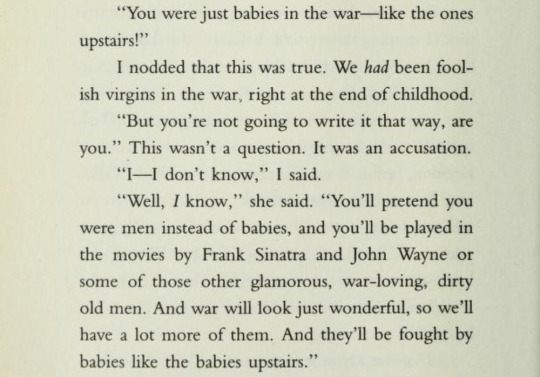
Kurt Vonnegut, Slaughterhouse-Five

George S. McGovern
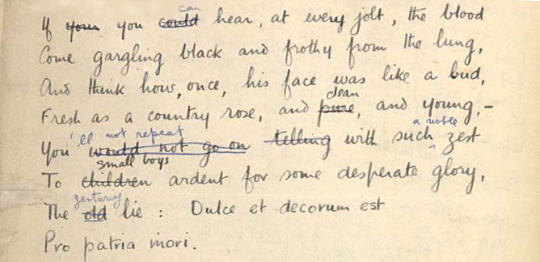
Wilfred Owen, Dulce Et Decorum Est
#webs#web weaving#theme: war#theme: peace#theme: death#theme: childhood#mine#all of my thoughts go to the people of ukraine and to the soldiers who will inevitably die fighting for the greed of a few powerful men#erich maria remarque#haruki murakami#siegfried sassoon#dalton trumbo#arthur miller#herbert hoover#markus zusak#ernest hemingway#wendell berry#jamala#alexandra christo#kurt vonnegut#george s. mcgovern#wilfred owen
1K notes
·
View notes
Text
McQuillan’s World: An Admirable Man
McQuillan’s World: An Admirable Man
The #1 source in the world for all things Harlem.
By Michael McQuillan An unmarked door bares a vacant bar where I want news, not booze. Chair-climbing to an aged black and white television, I find a CBS station for Continue Reading →
The post McQuillan’s World: An Admirable Man
View On WordPress
#elections#George McGovern#Harlem#Judy Harrington#Michael McQuillan#Mike’s World#New York&039;s Port Authority
0 notes